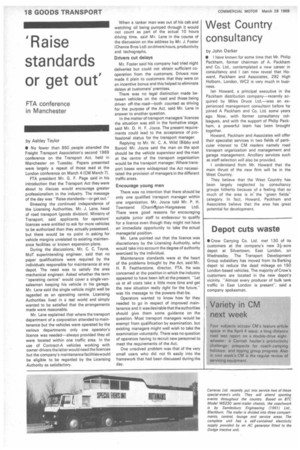'Raise standards or get out'
Page 20

If you've noticed an error in this article please click here to report it so we can fix it.
FTA conference in Manchester
by Ashley Taylor • No fewer than 850 people attended the Freight Transport Association's second 1969 conference on the Transport Act, held in Manchester on Tuesday. Papers presented were largely a repeat of those read at the London conference on March 4 (CM March 7).
FTA president Mr. G. F. Page said in his introduction that the Transport Act they were about to discuss would encourage greater professionalism in the industry. The message of the day was "Raise standards—or get out."
Stressing the continued independence of the Licensing Authorities, Mr. J. Lane, head of road transport (goods division), Ministry of Transport, said applicants for operators' licences were entitled to ask for more vehicles to be authorized than they actually possessed, but there would be no point in .asking for vehicle margins unrelated to existing maintenance facilities or known expansion plans.
During the discussions, Mr. C. C. Toyne. MoT superintending engineer, said that no paper qualifications were required by the individuals responsible for maintenance at any depot. The need was to satisfy the area mechanical engineer. Asked whether the term "operating centre" would cover a single vansalesman keeping his vehicle in his garage, Mr. Lane said the single vehicle might well be regarded as an operating centre. Licensing Authorities lived in a real world and simply wanted to be satisfied that the arrangements made were reasonable.
Mr. Lane explained that where the transport department of a corporation attended to maintenance but the vehicles were operated by the various departments only one operator's licence was needed—always provided they all were located within one traffic area. In the use of Contract-A vehicles working with owner-drivers the latter would need the licences but the company's maintenance faci litieswou Id be eligible to be regarded by the Licensing Authority as satisfactory. When a tanker man was out of his cab and watching oil being pumped through it would not count as part of the actual 10 hours driving time, said Mr. Lane in the course of the discussion on the address by Mr. J. Foster (Chance Bros Ltd) on drivers hours, productivity and tachographs.
Drivers cut delays Mr. Foster said his company had tried night deliveries but could not obtain sufficient cooperation from the customers. Drivers now made it plain to customers that they were on an incentive bonus and this helped to eliminate delays at customers' premises.
There was no legal distinction made between vehicles on the road and those being driven off-the-road---both counted as driving for the purpose of the Act. said Mr. Lane in answer to another question.
In the matter of transport managers' licences the situation was still in the formative stage, said Mr. D. H. F. Joyce. The present requirements could lead to the acceptance of professional status for the transport manager.
Replying to Mr. W. C. A. Wild (Bibby and Baron) Mr. Joyce said the man on the spot should be the vehicle supervisor and the man at the centre of the transport organization would be the transport manager. Where transport bases were widespread the Act necessitated the provision of managers in the different traffic areas.
Encourage young men There was no intention that there should be only one qualified transport manager within one organization, Mr. Joyce told Mr. P. H.
Townsend (Chard tton-H a rg reeves Ltd). There were good reasons for encouraging suitable junior staff to endeavour to qualify for a licence even though they might not have an immediate opportunity to take the actual managerial position.
Mr. Lane pointed out that the licence was discretionary by the Licensing Authority, who would take into account the degree of authority exercised by the individual.
Maintenance standards were at the heart of the problems brought by the Act, said Mr. H. R. Featherstone, director, FTA. He was concerned at the position in which the industry appeared to have been left at the present. "Let us at all costs take a little more time and get the new situation really right for the future," was his message to the powers-that-be.
Operators wanted to know how far they needed to go in respect of improved maintenance and it was desirable that the authorities should give them some guidance on the question. Most transport managers would be exempt from qualification by examination, but existing managers might well wish to take the examination voluntarily. There was no question of operators having to recruit new personnel to meet the requirements of the Act.
One unsolved problem was that of the very small users who did not fit easily into the framework that had been discussed during the day.










































































































